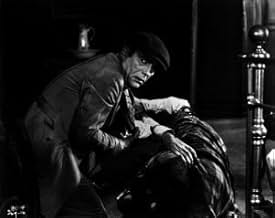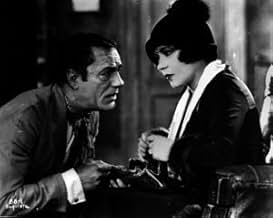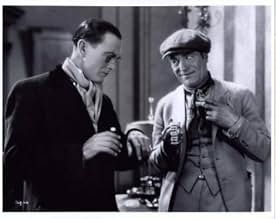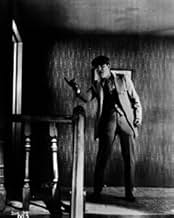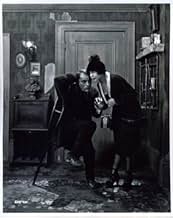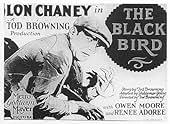IMDb-BEWERTUNG
6,7/10
963
IHRE BEWERTUNG
Füge eine Handlung in deiner Sprache hinzuTwo thieves, the Blackbird and West End Bertie, fall in love with the same girl, a French nightclub performer named Fifi. Each man tries to outdo the other to win her heart.Two thieves, the Blackbird and West End Bertie, fall in love with the same girl, a French nightclub performer named Fifi. Each man tries to outdo the other to win her heart.Two thieves, the Blackbird and West End Bertie, fall in love with the same girl, a French nightclub performer named Fifi. Each man tries to outdo the other to win her heart.
- Regie
- Drehbuch
- Hauptbesetzung
- Auszeichnungen
- 1 wins total
Andy MacLennan
- The Shadow
- (as Andy Maclennan)
Charles Avery
- Music Hall Patron
- (Nicht genannt)
Lionel Belmore
- Music Hall Proprietor
- (Nicht genannt)
Margaret Bert
- Minor Role
- (Nicht genannt)
Peggy Best
- Minor Role
- (Nicht genannt)
Louise Emmons
- Old Lady at Mission
- (Nicht genannt)
Willie Fung
- Chinese Man
- (Nicht genannt)
Fred Gamble
- Man Saying There's a Present for Fifi
- (Nicht genannt)
Joseph Hazelton
- Man at Table in Music Hall
- (Nicht genannt)
Cecil Holland
- Old Man at Mission
- (Nicht genannt)
Bertram Johns
- Member of Bertie's Slumming Party
- (Nicht genannt)
Empfohlene Bewertungen
Lon Chaney's twisted performance as the eponymous Blackbird is much fun, as he literally bends himself all out of shape to pretend himself his good, crippled brother, the Bishop. The tortuous melodrama and love triangles of the rest of the film, however, leaves much to be desired. At least, with a Chaney and Tod Browning collaboration, one is bound to be treated to something at least a little offbeat, and such is the case in "The Blackbird," although it doesn't quite reach the level of their better films, such as "The Unholy Three" (1925) and "The Unknown" (1927), although its ironic twist of fate, or double deception, anticipates the latter.
Besides Chaney's physically-demanding dual roles, there are a couple things I appreciate about this one that reinforces his performance. One is the play-within-the-play puppetry. Blackbird's love interest played by Renée Adorée is a vaudeville performer whose face is superimposed over the pliable body of the puppet, the effect not only being actually a film-within-a-film with the multiple-exposure trick--a photographic technique rather than a theatrical one--but also to mirror Chaney's physical transformations. Adorée's stage performance being explicitly a trick calls attention to the doubled deception supposedly off-stage by Chaney--that of his fooling fellow characters and that of the few moments on screen where he doesn't share the deception with the spectator. Even though the photoplay spends too much time on Chaney and the rest lounging about at the club's bar doing not much of anything and even taking time out for Blackbird to intimidate an interracial couple and for a couple of intertitles to include a racial slur against Chinese characters, I do appreciate the reflexivity of the play-within-play, or film-within-film puppetry.
The other interesting aspect is Owen Moore's character. Whereas Chaney's Blackbird/Bishop continues a charade, including going in and out of his room to change personas as if anticipating Clark Kent going into phone booths to reveal his Superman costume, to maintain his "true identity" as a lowly thief by the protection of his respectable alter ego, Moore's "West End Bertie" has completely adopted his respectable persona as a dandy while still carrying out thefts--and, more than that, he exploits the character for the purpose of stealing from his upper-class acquaintances. The love triangle stuff is bland, especially when an old lover of Blackbird's is thrown in the mix, but the initial fascination and rivalry expressed by Chaney when Moore's character is fully revealed to him is compelling.
If one gets past some particularly bad pacing and overdone melodrama for this Browning-Chaney collaboration, or that Adorée's performer turns out to be disappointingly featherbrained and Moore's monocle-wearing dandy none too interesting, either, after his initial confrontation with Chaney's Blackbird, there's clever, reflexive play going on here. On stage in the puppetry and off-stage in the criminal deception and anchored by Chaney's unparalleled bodily versatility, it's a film about characters who pretend to be something else--actors playing actors--and about the malleability and illusory quality of cinema.
Besides Chaney's physically-demanding dual roles, there are a couple things I appreciate about this one that reinforces his performance. One is the play-within-the-play puppetry. Blackbird's love interest played by Renée Adorée is a vaudeville performer whose face is superimposed over the pliable body of the puppet, the effect not only being actually a film-within-a-film with the multiple-exposure trick--a photographic technique rather than a theatrical one--but also to mirror Chaney's physical transformations. Adorée's stage performance being explicitly a trick calls attention to the doubled deception supposedly off-stage by Chaney--that of his fooling fellow characters and that of the few moments on screen where he doesn't share the deception with the spectator. Even though the photoplay spends too much time on Chaney and the rest lounging about at the club's bar doing not much of anything and even taking time out for Blackbird to intimidate an interracial couple and for a couple of intertitles to include a racial slur against Chinese characters, I do appreciate the reflexivity of the play-within-play, or film-within-film puppetry.
The other interesting aspect is Owen Moore's character. Whereas Chaney's Blackbird/Bishop continues a charade, including going in and out of his room to change personas as if anticipating Clark Kent going into phone booths to reveal his Superman costume, to maintain his "true identity" as a lowly thief by the protection of his respectable alter ego, Moore's "West End Bertie" has completely adopted his respectable persona as a dandy while still carrying out thefts--and, more than that, he exploits the character for the purpose of stealing from his upper-class acquaintances. The love triangle stuff is bland, especially when an old lover of Blackbird's is thrown in the mix, but the initial fascination and rivalry expressed by Chaney when Moore's character is fully revealed to him is compelling.
If one gets past some particularly bad pacing and overdone melodrama for this Browning-Chaney collaboration, or that Adorée's performer turns out to be disappointingly featherbrained and Moore's monocle-wearing dandy none too interesting, either, after his initial confrontation with Chaney's Blackbird, there's clever, reflexive play going on here. On stage in the puppetry and off-stage in the criminal deception and anchored by Chaney's unparalleled bodily versatility, it's a film about characters who pretend to be something else--actors playing actors--and about the malleability and illusory quality of cinema.
Caught this one at the Film Forum in NYC recently. I have not seen a great deal of Lon Chaney's work outside of 'Phantom' and 'The Hunchback of Notre Dame' but I thought he was excellent in his dual role in 'The Blackbird'. In fact, he carried the picture and the rest of the cast in this fairly routine melodrama set in the Limehouse district of 1920's London.
Had not seen Owen Moore before but I felt he was very competent. A veteran of silents, he died prematurely in the late '30's. Renee Adoree was a perky ball of fluff and added her good looks to the proceedings.
I did think the premise of the story was a stretch, especially as he presumably hoodwinked his ex-wife as well as all others with his dual-existence duplicity. The sets and the extras seemed extremely authentic and added immeasurably to the production.
This was worth the price of admission, especially Chaney's virtuoso performance. I hope to see others in the future to determine if this was an exception or the norm.
Had not seen Owen Moore before but I felt he was very competent. A veteran of silents, he died prematurely in the late '30's. Renee Adoree was a perky ball of fluff and added her good looks to the proceedings.
I did think the premise of the story was a stretch, especially as he presumably hoodwinked his ex-wife as well as all others with his dual-existence duplicity. The sets and the extras seemed extremely authentic and added immeasurably to the production.
This was worth the price of admission, especially Chaney's virtuoso performance. I hope to see others in the future to determine if this was an exception or the norm.
Perhaps, one of the lesser known collaborations between Lon Chaney Sr. and director Tod Browning--"The BlackBird" has all the conventional trappings of a Chaney/Browning film; or any Chaney Sr. film now that I think about it. One of those trappings being the "love triangle" as it seems that Chaney spends a fair amount of time pining for a woman who ends up falling in love with another man.
This film also has Lon playing a double role--no elaborate makeups to disguise himself with--just the master craftsman contorting his body to play the part of the crippled "Bishop", and his nefarious brother "The Blackbird." Apparently, the Blackbird needed a cover to help hide his criminal activities and thus the part of the Bishop comes into play.
"The Blackbird" starts off a bit slow, as we the audience are introduced to all the principal characters, but picks up steam towards the end. Overall, I can see why this movie is not one of the more well-known Chaney/Browning collaborations--not that I'm saying it's bad, far from it. It's a good movie & if you're a fan of Chaney Sr. then you will definitely add this one to your collection. Now, if someone could only find a surviving print of "London After Midnight."
7 stars
This film also has Lon playing a double role--no elaborate makeups to disguise himself with--just the master craftsman contorting his body to play the part of the crippled "Bishop", and his nefarious brother "The Blackbird." Apparently, the Blackbird needed a cover to help hide his criminal activities and thus the part of the Bishop comes into play.
"The Blackbird" starts off a bit slow, as we the audience are introduced to all the principal characters, but picks up steam towards the end. Overall, I can see why this movie is not one of the more well-known Chaney/Browning collaborations--not that I'm saying it's bad, far from it. It's a good movie & if you're a fan of Chaney Sr. then you will definitely add this one to your collection. Now, if someone could only find a surviving print of "London After Midnight."
7 stars
If it weren't for the acting technique of LON CHANEY, here deceiving others by assuming a dual role, THE BLACKBIRD would be a lot less interesting to discuss. The plot at first promises to be intriguing, but soon becomes bogged down in a story of petty jealousy between two crooked men for the affections of a pretty girl.
OWEN MOORE is the aristocratic looking gentleman thief in love with RENEE ADOREE, as is Chaney. One of the film's saving graces are the close-ups of Chaney glowering at Moore when he realizes he's winning the heart of the girl that both of them love. Chaney uses all of his facial mannerisms in a way that makes the screen titles almost unnecessary since he tells everything with his eyes and his body movements.
But the thin plot is the culprit here. Many scenes drag on too long without sufficient reason to and the plot is ultimately a weak one by any standards. Todd Browning does get a terrific performance from Chaney, though, and that's the chief reason for watching in the first place.
The tawdry atmosphere of the Limehouse London scenes is effective but the story's ending is a weakness.
Summing up: Highly watchable for Chaney alone.
OWEN MOORE is the aristocratic looking gentleman thief in love with RENEE ADOREE, as is Chaney. One of the film's saving graces are the close-ups of Chaney glowering at Moore when he realizes he's winning the heart of the girl that both of them love. Chaney uses all of his facial mannerisms in a way that makes the screen titles almost unnecessary since he tells everything with his eyes and his body movements.
But the thin plot is the culprit here. Many scenes drag on too long without sufficient reason to and the plot is ultimately a weak one by any standards. Todd Browning does get a terrific performance from Chaney, though, and that's the chief reason for watching in the first place.
The tawdry atmosphere of the Limehouse London scenes is effective but the story's ending is a weakness.
Summing up: Highly watchable for Chaney alone.
London's Limehouse District, "with its lust, greed, and love," lightly blankets its citizens in a sea of fog. There, ambidextrous Lon Chaney (as Dan Tate) successfully spends his nights thieving as "The Blackbird"; and, otherwise, masquerading as his own benevolent, but deformed, brother "The Bishop". Mr. Chaney likes to visit the local pub, where he falls for charming French entertainer Renée Adorée (as Fifi Lorraine). But, Ms. Adorée also attracts suave Owen Moore (as Bertram P. Glayde). Mr. Moore is a rival crook, who goes by the name "West End Bertie". So, conniving Chaney uses his respectable "Bishop" disguise to come between the increasingly more successful Adorée-Moore romance.
This is a formulaic Browning/Chaney film, featuring one of the versatile actor's lesser "disguises". For his transformation, Cheney twists an arm and a leg out of shape. It's more difficult than it looks to walk around in the disjointed position. Of course, Chaney's performance is outstanding. In particular, watch his reaction shots, which are incredibly accurate in mirroring whatever he is looking at, or reacting to. Co-stars Moore and Adorée also shine. Adorée had just been seen in "The Big Parade", and Moore has one of his meatier 1920s roles. Also enjoyable is Doris Lloyd (as "Limehouse" Polly), the ex-wife who loves Chaney.
******* The Blackbird (1926) Tod Browning ~ Lon Chaney, Owen Moore, Renée Adorée
This is a formulaic Browning/Chaney film, featuring one of the versatile actor's lesser "disguises". For his transformation, Cheney twists an arm and a leg out of shape. It's more difficult than it looks to walk around in the disjointed position. Of course, Chaney's performance is outstanding. In particular, watch his reaction shots, which are incredibly accurate in mirroring whatever he is looking at, or reacting to. Co-stars Moore and Adorée also shine. Adorée had just been seen in "The Big Parade", and Moore has one of his meatier 1920s roles. Also enjoyable is Doris Lloyd (as "Limehouse" Polly), the ex-wife who loves Chaney.
******* The Blackbird (1926) Tod Browning ~ Lon Chaney, Owen Moore, Renée Adorée
Wusstest du schon
- WissenswertesThe Blackbird (Lon Chaney) was called The Mocking Bird in earlier versions of the film.
- Zitate
Woman with Diamond Choker: I say... we are going down Plum Alley to see the Chinkies smoking.
West End Bertie: I say... shall we go?
- VerbindungenFeatured in MGM: When the Lion Roars (1992)
Top-Auswahl
Melde dich zum Bewerten an und greife auf die Watchlist für personalisierte Empfehlungen zu.
Details
- Erscheinungsdatum
- Herkunftsland
- Sprachen
- Auch bekannt als
- Zigeuner im Frack
- Drehorte
- Produktionsfirma
- Weitere beteiligte Unternehmen bei IMDbPro anzeigen
Box Office
- Budget
- 166.000 $ (geschätzt)
- Laufzeit
- 1 Std. 26 Min.(86 min)
- Farbe
- Sound-Mix
- Seitenverhältnis
- 1.33 : 1
Zu dieser Seite beitragen
Bearbeitung vorschlagen oder fehlenden Inhalt hinzufügen


